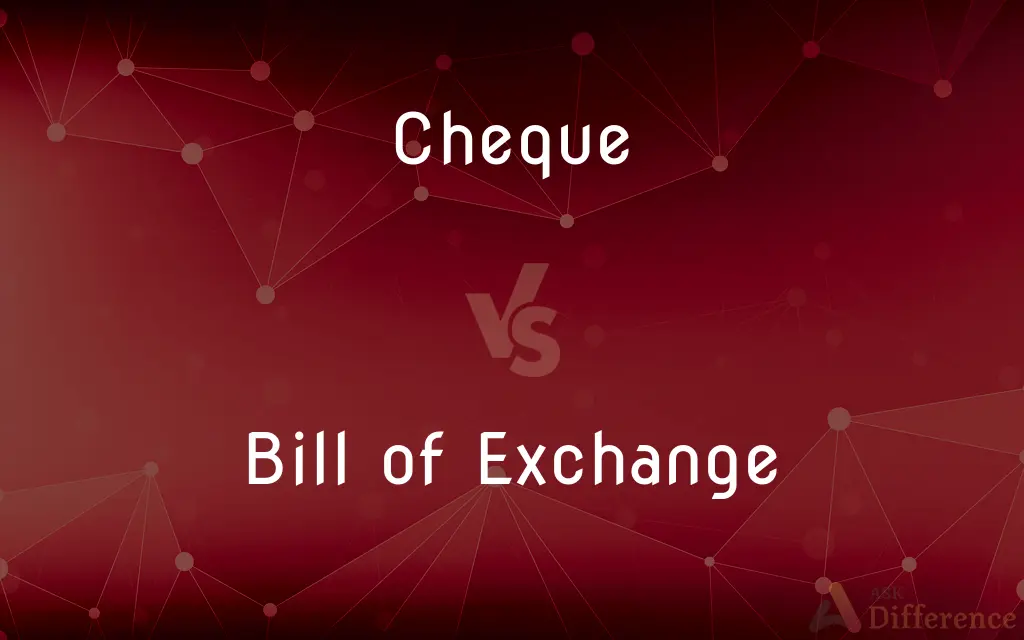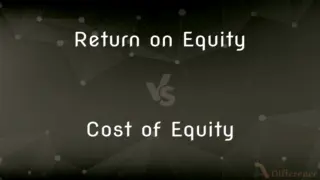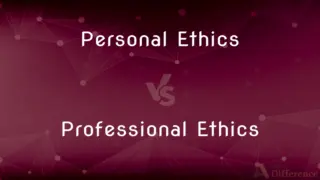Cheque vs. Bill of Exchange — What's the Difference?
By Tayyaba Rehman — Published on November 20, 2023
Cheque is a written order to a bank to pay a specific amount from one's account. Bill of Exchange is a written order to a third party to pay a specific amount on a particular date.

Difference Between Cheque and Bill of Exchange
Table of Contents
ADVERTISEMENT
Key Differences
A Cheque is a document that orders a bank to pay a specific amount from the drawer's account to the payee. The Bill of Exchange, on the other hand, is a binding agreement where one party orders another to pay a third party a specified sum on a designated date. Both Cheque and Bill of Exchange serve as instruments for transferring money, but they operate in slightly different manners.
Cheques are commonly used for everyday transactions, like settling bills or withdrawing money. The Bill of Exchange is often used in international trade, signifying a promise to pay on a particular date in the future. While both Cheque and Bill of Exchange are written orders, the entities involved differ.
In terms of acceptance, a Cheque doesn't need acceptance by the party it's drawn upon. The bank simply honors it if there are sufficient funds. In contrast, the Bill of Exchange requires acceptance by the party it's drawn upon before it's honored. Therefore, while both Cheque and Bill of Exchange can be presented for payment, the latter's process is more intricate.
Lastly, a Cheque is always drawn on a bank or financial institution. The Bill of Exchange can be drawn on any individual or institution. Thus, while both Cheque and Bill of Exchange represent written orders to pay, their scope and application differ significantly.
Comparison Chart
Drawn On
Always on a bank or institution.
Any individual or institution.
ADVERTISEMENT
Usage
Everyday transactions.
Often in international trade.
Acceptance Required
No.
Yes, by the party it's drawn upon.
Number of Parties
Three: Drawer, Drawee, Payee.
Three: Drawer, Drawee, Payee.
Payment Timeframe
On demand.
On a specified future date.
Compare with Definitions
Cheque
Variant of check.
Bill of Exchange
An instrument directing payment to a third party.
Using a Bill of Exchange, he secured his overseas transaction.
Cheque
A draft directing a bank to pay money to a named person or entity.
I was not carrying cash, so I wrote a cheque for the amount.
Sometimes abbreviations are used (which would be explained on the statement) and only the last three figures of the cheque number may be given. ‘Sundries’ are cash or cheques paid into the account.
You can avoid dealing with paper cheques — written or printed — by paying your bills online.
The daily cheque clearings began around 1770 when bank clerks met at the Five Bells (a tavern in Lombard Street in the City of London) to exchange all their cheques in one place and settle the balances in cash.
Bill of Exchange
A promise to pay on a certain date.
The Bill of Exchange had a 60-day payment term.
Cheque
A written order directing a bank to pay money;
He paid all his bills by check
Bill of Exchange
A tool in international trade for payment.
Importers often rely on the Bill of Exchange for securing goods.
Cheque
Withdraw money by writing a check
Bill of Exchange
A written order for payment.
The company issued a Bill of Exchange to its supplier.
Bill of Exchange
A formal document of financial agreement.
He had to accept the Bill of Exchange before funds were released.
Common Curiosities
Is a Cheque always drawn on a bank?
Yes, a Cheque is always drawn on a bank or financial institution.
What is a Bill of Exchange?
A Bill of Exchange is a written order from one party to another, directing them to pay a third party a specified sum on a specific date.
When is a Bill of Exchange used?
A Bill of Exchange is often used in international trade or business transactions requiring credit.
Can a Bill of Exchange be drawn on any entity?
Yes, a Bill of Exchange can be drawn on any individual or institution.
Are Cheques and Bills of Exchange negotiable instruments?
Yes, both are negotiable instruments used for the transfer of money.
Can a Cheque be post-dated?
Yes, a Cheque can be post-dated, meaning it is not valid until that future date.
Can a Cheque be transferred to someone else?
Yes, if it's a bearer or endorsed properly, a Cheque can be transferred.
Can a Bill of Exchange be renewed?
Yes, it can be renewed or extended based on the agreement between parties.
Do both Cheque and Bill of Exchange require acceptance?
No, while a Bill of Exchange requires acceptance by the drawee, a Cheque does not.
What is a Cheque?
A Cheque is a written order directing a bank to pay a specified amount from one's account to a designated individual or entity.
Is a Cheque considered cash?
No, a Cheque represents an order to pay cash, but it isn't cash itself.
Is a bounced Cheque the same as a dishonored Bill of Exchange?
Both refer to non-payment, but a bounced Cheque means there were insufficient funds, while a dishonored Bill of Exchange can be for various reasons.
Is it mandatory to have a Cheque leaf to issue a Cheque?
Yes, a Cheque is issued on a specific bank Cheque leaf.
Who are the parties involved in a Bill of Exchange?
The drawer, drawee, and payee are the parties in a Bill of Exchange.
Why is the Bill of Exchange important in trade?
It provides security in credit transactions, ensuring that payment will be made on a specific date.
Share Your Discovery

Previous Comparison
Return on Equity vs. Cost of Equity
Next Comparison
Personal Ethics vs. Professional EthicsAuthor Spotlight
Written by
Tayyaba RehmanTayyaba Rehman is a distinguished writer, currently serving as a primary contributor to askdifference.com. As a researcher in semantics and etymology, Tayyaba's passion for the complexity of languages and their distinctions has found a perfect home on the platform. Tayyaba delves into the intricacies of language, distinguishing between commonly confused words and phrases, thereby providing clarity for readers worldwide.











































